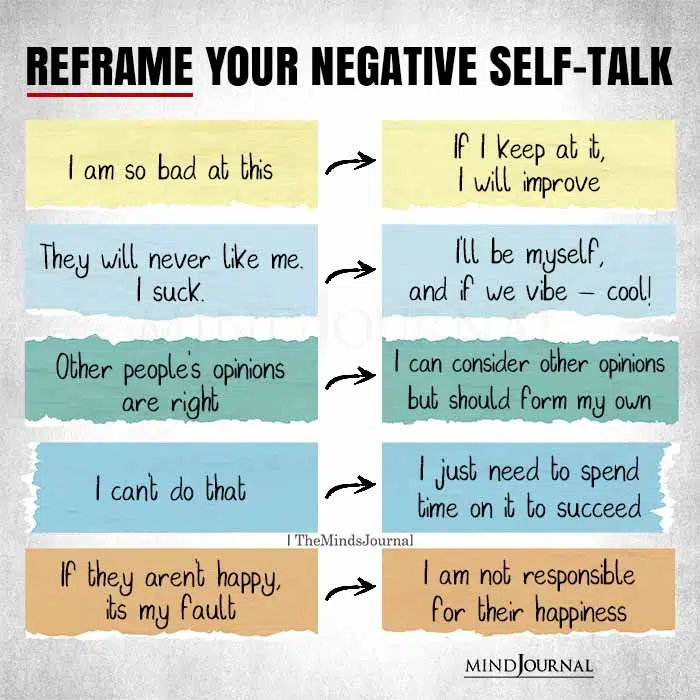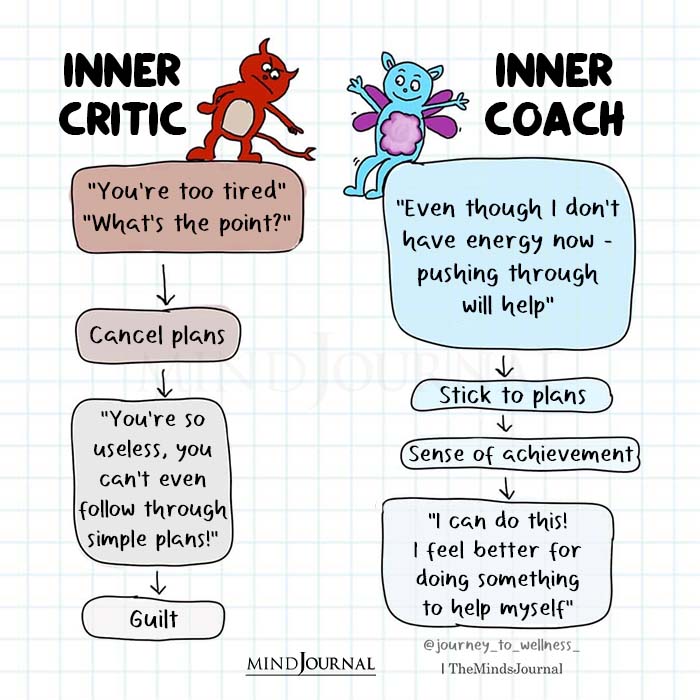“Turn down the volume of your negative inner voice and create a nurturing inner voice to take it’s place. When you make a mistake, forgive yourself, learn from it, and move on instead of obsessing about it. Equally important, don’t allow anyone else to dwell on your mistakes or shortcomings or to expect perfection from you.” ― Beverly Engel. This one quote perfectly shows why it’s important to silence your inner critic.
Do you have a love/hate relationship with your inner monologue? You know, the voice that can motivate you to press on or stop you dead in your tracks and make you feel a few inches tall.
It is the same voice that attempts to protect you from shame, embarrassment, or making a mistake. If not tamed and regulated, this voice morphs into an intense critic, one that can sabotage and stagnate if it gains too much power.
When this happens, your confidence levels and ability to remain curious are compromised and fiercely blunted.
Your busy inner critic pulls from past experiences while it simultaneously decodes current situations and scans them for potential threats. Unfortunately, the assessments tend to operate through a filter that is negative and self-centered.
The ‘what ifs’ start rushing in and you find it difficult to access resilience or problem-solving skills. Or, you are bombarded with others’ potential judgments or become debilitated by the for-certain doom you have already created for yourself.
Related: How To Silence Your Inner Critic: 3 Secrets For Silencing Your Inner Critic
Engaging in such thought spirals or mindsets that support perfectionism only tends to fuel negative correlations in the brain.
There is good news, though. You are capable of creating new connections and positive associations in the brain. This process is referred to as neuroplasticity. When you adopt a positive mindset that encourages positive self-talk, the brain changes and behavior modification occurs.
So, first and foremost, change can not take place before taking the steps necessary to increase your level of self-awareness. The first step in gathering such data requires check-ins.
Begin by allocating time throughout the day to:
- Evaluate how you’re feeling
- Identify the themes/commonalities of your thoughts
- Note your level of presence
- Monitor your inner critic
- Rebalance your inner power
These check-ins do not involve self-judgment nor is it necessary for you to initially solve and fixate on removing the emotions, even when they are uncomfortable. The check-ins are simply spaces to validate the emotion, gather data, and identify a thought or behavioral patterns.
After the check-in, you can then move into rebalancing your emotions with logic and assessing your options, or whether or not you are going to engage and give power to the thought process, if necessary.

5 Ways To Silence Your Inner Critic
1. Take care of the basics
In order for you to calm your inner critic and change your mindset, a great deal of attention needs to be placed on self-care. Honing in on the basics of just being a human being are critical and set the tone for success.
What is standing in the way of your ability to get a good night’s sleep, drink more water, eat healthy meals regularly, or incorporate movement consistently? These are the basics, yet seem to be the hardest tasks for people to maintain.
When you take care of your basic needs and associate these practices with self-respect and rejuvenation, you begin to clear away the mental clutter that is preventing you from building confidence, adopting healthy mindsets, and making positive connections.
Related: How To Tame Your Inner Critic: 5 Ways To Stop Your Inner Critic In Its Tracks
2. Play fair
The check-ins help you identify how you talk to yourself and the narratives you tend to create for your interactions and experiences. Unfortunately, you might be amazed at how critical, mean, and impatient your inner monologue can be.
Don’t fret, you’re not alone, you just have some work to do. Remember that you also had some help adopting such mindsets and behaviors. Past traumas, emotional neglect, abuse, perfectionism, and simply being a pleaser all can contribute to negative self-talk.
Can you imagine ridiculing and critically responding to every single statement or effort a friend or child made? Think of the damage this would do.
If you are one-sided and frequently beat yourself down while disregarding any positive steps or successes, you are fueling imbalance and not playing fair. For every internal insult or bash, make an attempt to counter it with a positive affirmation.
Yes, this is a balancing act and it takes practice, but incorporating grace, kindness, and patience are necessary steps in healthy relationships with others and must be prioritized in the relationship with yourself. You may have to simply fake it ‘till you make it, but it will become more habitual and natural with time.
3. Move away from a self-centered filter
When the inner critic takes over and compromises the very essence of who you are, it’s time to fight back and insert logic into the mix.
Try rebalancing yourself with these questions:
- What can I control?
- What are my options?
- What can I learn?
- What can I give up/surrender?
- What is the worst that can happen?
Experiences and events do not just center around you. There are other factors, decisions, and behaviors involved. Simply reminding yourself of the fact that no one is analyzing and decoding certain conversations and memories with the same filter you are can be highly effective and grounding.
Your insecurities, expectations, and thought process are uniquely yours and may never be known to others unless you choose to share. You are but one piece of this amazing, huge world. These reminders can be humbling and freeing at the same time.
Related: Silencing Your Inner Critic: 5 Snappy Comebacks For Your Inner Critic
4. Spread kindness and stay connected
When your inner critic has too much power, you tend to view experiences and interactions through a self-centered lens. The more you focus on yourself, the more you analyze and engage in destructive thinking. Unfortunately, these thought patterns become ingrained and automatic.
Do you often give others the benefit of the doubt, but repeatedly chastise your efforts and thoughts? To reduce this type of internalization, start by challenging yourself to gather more info, ask questions, and approach conversations with an open mind.
Play fair. Practice presence by tapping into your senses and make a strong effort to be an active listener and “show up” when people are involved. The reprioritization of energy and shift in focus will help silence your inner critic and relocate space in the brain.
Another way to shift your awareness outward is to serve others. Research shows that random acts of kindness can build connection, generate positivity, and increase your sense of purpose.
Bryant Hui, one of the leading researchers on kindness, discovered that people who perform informal acts of kindness tend to be happier and have higher levels of self-efficacy. He also discovered that they experienced fewer symptoms associated with depression and anxiety.
The Dalai Lama said it best, “If you want others to be happy, practice compassion. If you want to be happy, practice compassion.” At first, these efforts might seem forced or ingenuine, but keep at it. Such acts will get easier and you will undoubtedly start to feel the benefits and release of oxytocin.

5. Take risks to build confidence
Confidence requires reps and deliberation. It grows when you take risks and welcome discomfort. Repetition leads to comfort and fuels connection with yourself, others, and experiences.
Learning to view setbacks as opportunities to learn and develop rather than failures will help adopt a mindset that categorizes life as a journey, not a pass-or-fail test. You may need to reconfigure your expectations and reconstruct the false narratives associated with certain goals or roles.
This is possible if you take a pause, reflect, shift, and practice consistency. You have the ability to change and your mind has the capability to create new associations to build confidence, stability, and growth.
Related: Tame Your Inner Critic: How to Silence the Negative Voice Inside Your Head
Start with the basics and tap into your inner voice to silence your inner critic. How you speak to yourself truly does matter and greatly influences the narratives you create for yourself.
References: Hui, B. P. H., Ng, J. C. K., Berzaghi, E., Cunningham-Amos, L. A., & Kogan, A. (2020). Rewards of kindness? A meta-analysis of the link between prosociality and well-being. Psychological Bulletin, 146(12), 1084–1116. https://doi.org/10.1037/bul0000298
Written By Leah Marone LCSW Originally Appeared On Psychology Today









Leave a Reply
You must be logged in to post a comment.